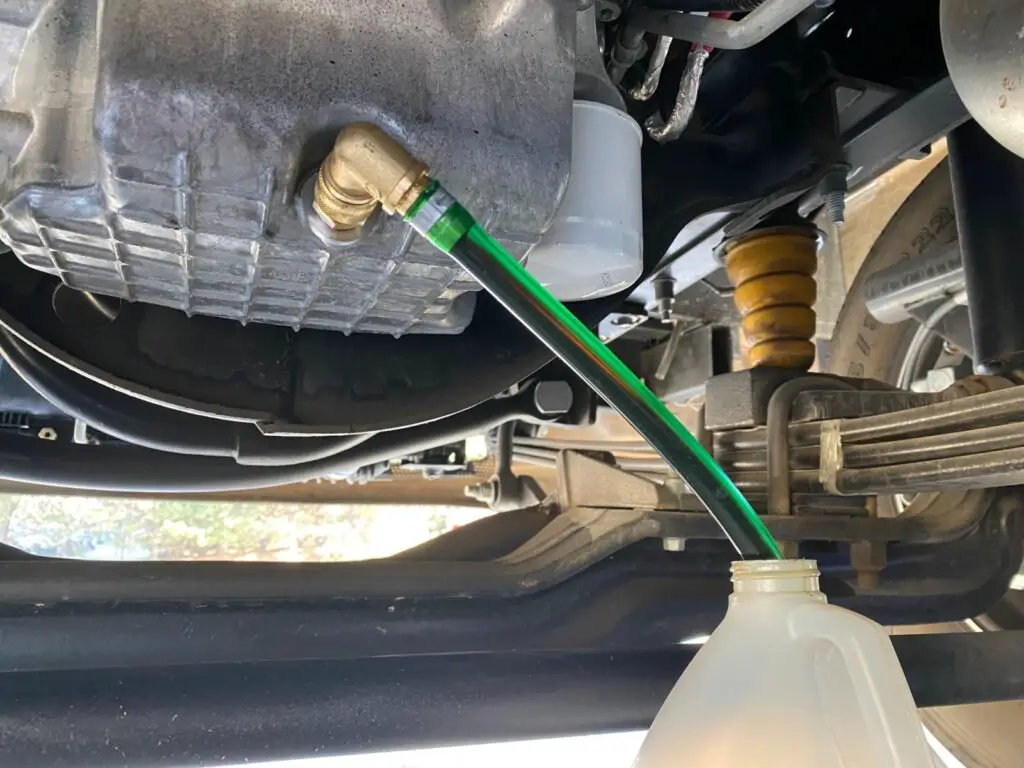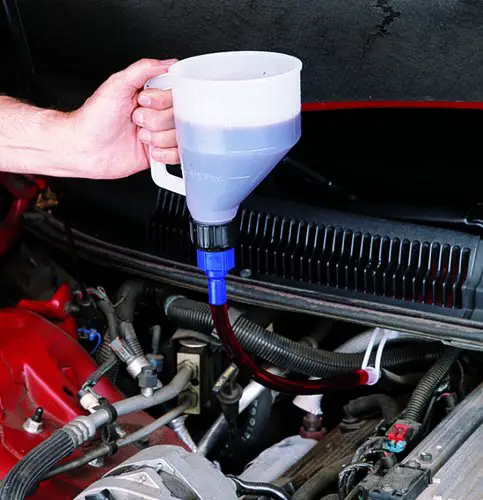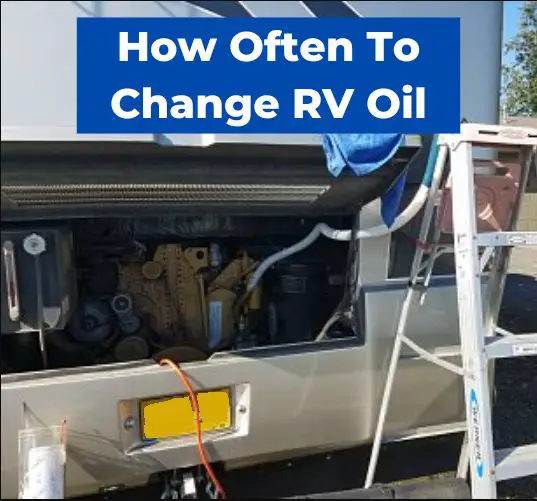RVs are a great way to travel and experience the outdoors. However, maintaining an RV can be a daunting task, especially when it comes to changing the oil. How often to change RV oil depends on several factors.
How often you should change your RV’s oil will depend on a few things: the distance you’ve driven since your last oil change, the time since your last oil change, and the recommendations from your oil brand and, most importantly, the recommendations from your RV or engine manufacturer. Gasoline engines in RVs should have their oil changed every 3,000 to 5,000 miles, while diesel engines should have their oil changed every 5,000 to 7,000 miles. This is just a general guideline, and the frequency of oil changes may vary depending on your specific RV and usage.
We’ll cover everything you need to know about RV oil change frequency in this guide.
Why Changing RV Oil is Important

Regular oil changes are essential for maintaining the longevity and performance of an RV’s engine. The engine oil lubricates the engine components and helps to prevent engine wear, which can lead to expensive repairs down the road.
RVs, especially motorhomes, have an internal combustion engine that requires routine maintenance just like any other vehicle. The frequency of oil changes will depend on a few factors such as the driving environment, fuel type, engine type, and oil type.
Diesel engines, commonly found in motorhomes, require more frequent changes than gasoline engines due to their high power and combustion chamber temperatures. Synthetic oils may also require more frequent changes in extreme temperatures or mountainous roads.
Regular oil changes also help to improve fuel economy and reduce emissions. Fresh oil helps to lubricate the engine and reduce friction, which in turn reduces the amount of power needed to operate the RV, resulting in better fuel economy.
Changing the oil is a relatively simple task that can be done by a mechanic or even a DIY enthusiast with the right tools and knowledge. To change the oil, one will need a drain pan, oil filter wrench, funnel, and wrench or socket to remove the oil pan drain plug.
It is important to keep a maintenance log and follow the manufacturer’s recommended maintenance schedule to ensure the engine is running at its best. Neglecting routine maintenance, including oil changes, can void the warranty and lead to costly repairs.
How Often to Change RV Oil

When it comes to changing the oil in an RV, there are a few factors to consider. The frequency of oil changes will depend on the distance driven since the last oil change, the time since the last oil change, and the recommendations from the RV or engine manufacturer.
Most RV experts recommend changing the oil at least twice a year, regardless of mileage. This is especially important for RVs that sit for extended periods as oil can break down over time and lose its effectiveness.
For gasoline engines, it is generally recommended to change the oil every 3,000 to 5,000 miles. For diesel engines, the recommended interval is every 5,000 to 7,000 miles. Always follow the manufacturer’s recommendations, even if they vary from the above figures.
It’s important to note that older or higher mileage RVs may require more frequent oil changes. Additionally, if the RV is primarily driven in the city rather than on the highway, more frequent oil changes may be necessary.
In addition to changing the oil, it’s also important to regularly check the oil level and condition. If the oil level is low or the oil appears dirty or contaminated, it may be necessary to change the oil more frequently.
Overall, it’s important to follow the manufacturer’s recommendations and to stay on top of regular oil changes to ensure the longevity and reliability of your RV’s engine.
| Gasoline Engine | Diesel Engine |
| Every 3,000 to 5,000 miles | Every 5,000 to 7,000 miles |
| Check oil level and condition regularly | Check oil level and condition regularly |
| Follow manufacturer’s recommendations | Follow manufacturer’s recommendations |
| Older or higher mileage RVs may require more frequent oil changes | Older or higher mileage RVs may require more frequent oil changes |
| City driving may require more frequent oil changes | City driving may require more frequent oil changes |
Factors to Consider When Deciding How Often to Change RV Oil

When it comes to RV oil change, there are several factors to consider. Here are some of the most important ones:
Engine Type
The type of engine in your RV will play a significant role in determining how often you should change the oil. Gasoline engines generally require oil changes every 3,000 to 5,000 miles, while diesel engines may need oil changes every 5,000 to 10,000 miles.
Driving Environment
The driving environment can also impact how often you need to change your RV’s oil. If you frequently drive on mountainous roads or in extreme temperatures, you may need to change your oil more often.
Mileage
The mileage on your RV is another important factor to consider. As a general rule, you should change your oil at least once a year, even if you haven’t driven very far. However, if you frequently take long road trips or drive your RV more than average, you may need to change your oil more often.
Oil Type
The type of oil you use in your RV can also impact how often you need to change it. Synthetic oil generally lasts longer than conventional oil, so you may be able to go longer between oil changes if you use synthetic oil.
Manufacturer’s Recommendations
Always check your RV owner’s manual for the manufacturer’s recommended oil change schedule. Following the manufacturer’s recommendations will help ensure that your RV runs smoothly and stays in good condition.
Routine Maintenance
Regular routine maintenance, such as checking the oil level and inspecting the engine, can also help you determine when it’s time to change your RV’s oil.
Oil Analysis
Oil analysis can provide valuable information about the condition of your RV’s engine and the quality of the oil. By analyzing the oil, you can determine if you need to change it sooner or later than usual.
Other Factors
Other factors that can impact how often you need to change your RV’s oil include the age of the engine, the type of oil filter you use, and the type of fuel filters you have. Keeping a maintenance log can help you keep track of when you need to change your oil and other routine maintenance tasks.
How to Change RV Oil
Changing the oil in an RV is a critical maintenance task that ensures the longevity and optimal performance of the engine. Here are the steps to follow to change the oil in an RV.
Here’s a great video walkthrough on how to change the oil in an RV:
Gather Supplies
Before starting the oil change process, ensure that you have all the necessary supplies, including fresh oil, an oil filter, an oil filter wrench, a drain pan, a funnel, and a drain plug. Ensure that you have the correct type of oil for your RV, whether it is synthetic or conventional oil.
Drain Old Oil
The first step in changing the RV oil involves draining the old oil. To do this, locate the oil pan and place the drain pan underneath it. Remove the drain plug to allow the old oil to drain completely. After draining the oil, replace the drain plug and tighten it securely.
Replace Oil Filter
The next step is to replace the oil filter. Locate the oil filter and use an oil filter wrench to remove it. Once removed, replace it with a new filter and tighten it securely.
Add New Oil
Using a funnel, pour the fresh oil into the engine. Ensure that you add the correct amount of oil as recommended by the RV manufacturer. After adding the oil, check the oil level using the dipstick.
Check Oil Level
To check the oil level, remove the dipstick and wipe it clean. Reinsert the dipstick and remove it again to check the oil level. Ensure that the oil level is within the recommended range.
Dispose of Old Oil
After completing the oil change process, dispose of the old oil responsibly. You can take it to a recycling center or an auto parts store that accepts used oil.
Frequently Asked Questions
The frequency of oil changes for RVs varies depending on the make, model, and engine type. Generally, mechanics recommend changing the oil in your RV every 3,000 to 5,000 miles or at least once a year.
If you use your RV frequently, you may need to change the oil more often. It’s essential to check your RV owner’s manual or consult with a trusted mechanic for specific recommendations.
The type of oil you should use for your RV depends on the engine type and manufacturer’s recommendations. Most RVs use conventional motor oil with a viscosity rating of 10W-30 or 10W-40. Some newer models may require synthetic oil. It’s crucial to follow the manufacturer’s recommendations for the best performance and longevity of your RV engine.
Synthetic oil is recommended for some RVs, especially those with diesel engines. It offers better performance and longer life than conventional oil, making it an excellent investment for RV owners who want to keep their engines running smoothly. Synthetic oil is more expensive than conventional oil, so it’s essential to weigh the benefits and costs before making a decision.
Finding a reliable RV oil change service can be challenging, but it’s essential for maintaining the health of your RV engine. You can start by asking for recommendations from other RV owners or checking online reviews. Look for a service that specializes in RV oil changes and has experience working with your RV make and model. It’s also crucial to ensure that the service uses high-quality oil and filters and has certified technicians.
Failing to change your RV oil regularly can lead to engine damage and decreased performance. Old oil can become contaminated with dirt and debris, reducing its lubricating properties and causing friction and wear on engine parts. Over time, this can lead to engine failure and costly repairs. Regular oil changes are essential for maintaining the health and longevity of your RV engine.
Changing your RV oil yourself can be a cost-effective option, but it’s essential to have the proper tools, knowledge, and experience.
If you’re not confident in your ability to change your RV oil safely and correctly, it’s best to hire a professional. A certified RV technician can ensure that your oil is changed correctly and that your engine is running smoothly.
If you have experience with car maintenance and feel confident in your abilities, changing your RV oil yourself can save you money and give you a sense of satisfaction.

